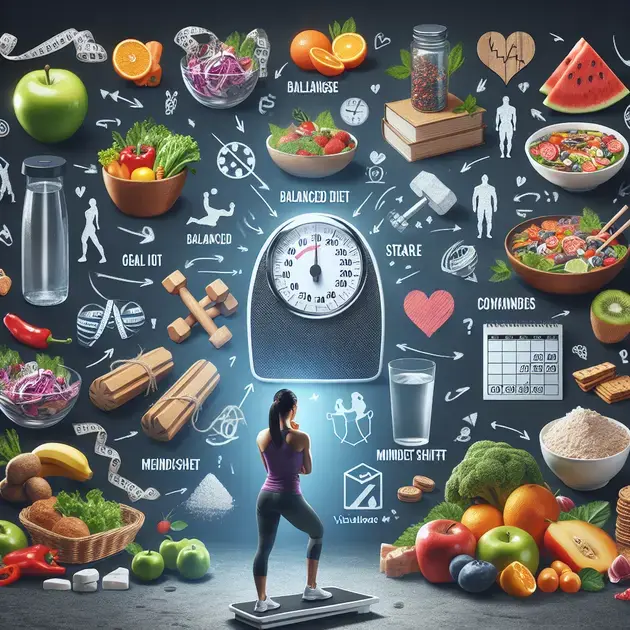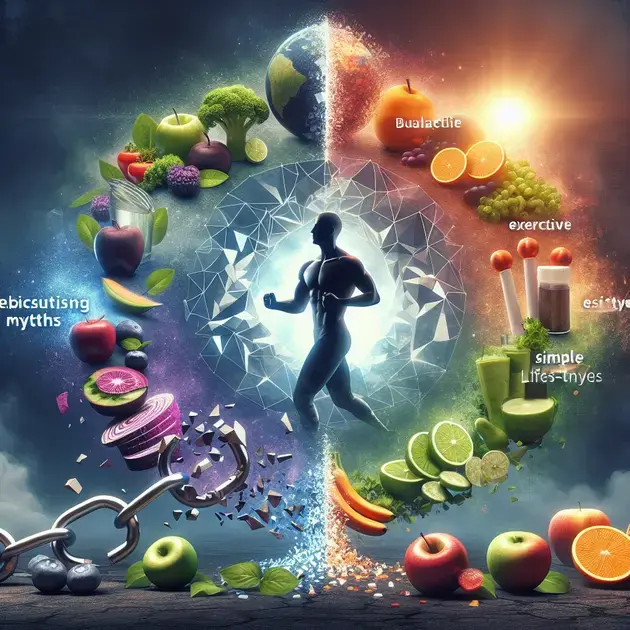In today’s fast-paced world, many people are searching for 3 effective strategies for rapid weight loss to achieve their fitness goals quickly. With the rise of social media, various diet trends and fitness fads are often presented as the ultimate solutions. However, the best strategies are often supported by research and tailored to individual needs, allowing for sustainable results that extend beyond temporary fixes.
Recent studies indicate that a combination of a balanced diet, regular exercise, and mindset shifts can significantly impact weight loss success. In this blog post, we’ll delve into these proven strategies that not only help shed pounds effectively but also promote overall health and well-being. Understanding these approaches will empower you to embark on your weight loss journey with confidence.

Balanced Diet for Weight Loss Success
A balanced diet plays a crucial role in achieving weight loss success. It involves incorporating a variety of foods to ensure you’re getting the necessary nutrients while creating a calorie deficit. Start by assessing your current eating habits. You can use the MyFitnessPal app to track your daily caloric intake and understand where adjustments are needed.
Next, focus on portion control. Using measuring cups or a food scale can help you manage portion sizes effectively. The app also allows users to log their meals, making it easier to stay within your daily limits. Incorporate more fruits and vegetables into your meals, as they provide essential vitamins and minerals while being low in calories.
Don’t skip meals, as this can lead to overeating later in the day. Instead, aim for three balanced meals and two healthy snacks. Utilize resources like the USDA’s MyPlate website for guidance on what a balanced plate should look like. This can help you select the right proportions of protein, carbohydrates, and fats.
Additionally, be mindful of your beverage choices. Opt for water, herbal teas, or black coffee to reduce calorie intake from sugary drinks. Consider apps like WaterMinder to remind you to stay hydrated throughout the day. Staying hydrated can also help curb hunger and promote better metabolic function.
Finally, educate yourself on healthy cooking methods. Steaming, grilling, or baking are preferable to frying. Websites like Yummly offer a plethora of healthy recipes that fit into a balanced diet. By making conscious choices and utilizing available resources, you set yourself up for weight loss success by adhering to a balanced diet.
Effective Exercise Routines for Rapid Results
When it comes to weight loss, exercise is essential. Implementing an effective routine can yield rapid results. Start by determining how often you can realistically work out each week. Aiming for at least three to five sessions is ideal. Use fitness apps like Nike Training Club for guided workouts tailored for various fitness levels.
Incorporate both cardiovascular and strength training exercises into your routine. Cardio can include activities like running, cycling, or dancing, which you can track via apps such as Strava. Aim for at least 150 minutes of moderate-intensity cardio each week to see effective results.
For strength training, consider a program that works all major muscle groups. This could be done two to three times per week. The Fitbod app generates personalized workout plans, allowing you to build muscle efficiently based on your available equipment and fitness level.
Don’t forget the importance of stretching and rest days. Apps like StretchIt offer guided sessions to improve flexibility, which can prevent injuries and promote recovery. Always listen to your body and ensure you’re allowing adequate time for muscle repair.
As you progress, track your workouts to keep yourself motivated. Using tools like Fitbit can help monitor your progress, track calories burned, and keep your goals in check. As you see improvements, increase the intensity of your workouts to continue challenging your body.
The Power of Mindset Shifts in Achieving Your Fitness Goals
A positive mindset is key to achieving fitness goals. Begin by setting SMART goals—Specific, Measurable, Achievable, Relevant, and Time-bound. Using a digital journal app like DayOne can help you articulate and track these goals over time. Reflect on your motivations and why you want to lose weight or improve your fitness.
Practice self-compassion. Understand that setbacks are a normal part of any journey. Consider adopting a growth mindset where challenges become learning experiences. Guided meditation apps like Headspace can help you cultivate a positive outlook and improve mental clarity.
Surround yourself with supportive individuals. Join fitness communities on social media or local groups where you can share your journey and gain encouragement. You can use platforms like Meetup to find groups that share similar fitness goals and interests.
Visualize your success regularly. Create a vision board with images and affirmations that resonate with your fitness aspirations. This can serve as a daily reminder of what you’re working towards. Tools like Canva allow you to create customized vision boards easily.
Finally, celebrate your small wins. Acknowledge each step towards your goal, whether it’s a workout accomplished or a healthy meal made. Use habit-tracking apps, such as Streaks, to reward yourself for sticking to your new habits. Acknowledging progress will reinforce positive behavior and encourage you to stay committed to your fitness goals.

Identifying Common Weight Loss Myths and Misconceptions
When it comes to weight loss, there are many myths and misconceptions that can make it difficult for people to achieve their goals. One common myth is that you have to drastically reduce your caloric intake in order to lose weight. While it’s true that creating a caloric deficit is necessary for weight loss, severely restricting your calories can actually hinder your progress and negatively impact your metabolism.
Another common misconception is that certain foods, like carbs or fats, should be completely avoided when trying to lose weight. In reality, a balanced diet that includes a variety of nutrients is key to successful weight loss. Restricting certain food groups can lead to deficiencies and make it harder to stick to your weight loss plan in the long term.
Many people also believe that weight loss supplements or fad diets are the key to quick and easy weight loss. However, these products often come with risks and can have negative effects on your health. Sustainable weight loss is best achieved through healthy eating habits and regular exercise.
It’s important to do your research and consult with a healthcare professional before starting any weight loss program to ensure that you are making informed choices based on facts rather than myths or misconceptions. By identifying and debunking these common weight loss myths, you can set yourself up for success on your weight loss journey.
Simple Lifestyle Changes That Promote Weight Loss
When it comes to losing weight, small lifestyle changes can make a big difference. One simple change you can make is to prioritize whole, nutrient-dense foods in your diet. This means focusing on fruits, vegetables, lean proteins, and whole grains, while minimizing processed foods and sugary drinks.
Another easy lifestyle change that can promote weight loss is staying hydrated by drinking plenty of water throughout the day. Proper hydration is important for overall health and can help control hunger and cravings, preventing overeating.
Incorporating regular physical activity into your daily routine is also key to promoting weight loss. Whether it’s going for a walk, taking a fitness class, or engaging in strength training, finding activities you enjoy can make it easier to stay active and burn extra calories.
Adequate sleep is another important factor in weight loss. Lack of sleep can disrupt your hormones and metabolism, making it harder to lose weight. Aim for 7-9 hours of quality sleep each night to support your weight loss efforts.
How to Stay Motivated on Your Weight Loss Journey
Staying motivated during a weight loss journey can be challenging, but there are strategies you can use to help maintain your focus and determination. Setting realistic and achievable goals is key to staying motivated. Break down your larger weight loss goal into smaller, manageable milestones to track your progress and celebrate your successes along the way.
Find a support system to help keep you motivated. Whether it’s a friend, family member, or online community, having someone to share your successes and struggles with can provide valuable encouragement and accountability.
Keep a journal to track your food intake, exercise routine, and emotions related to your weight loss journey. Reflecting on your habits and progress can help you stay motivated and identify any areas that may need adjustment.
Reward yourself for reaching milestones and achieving your goals. Treat yourself to a non-food reward, such as a relaxing massage or a new workout outfit, to celebrate your hard work and stay motivated to continue on your weight loss journey.
Conclusion
Weight loss journey often comes with numerous myths and misconceptions that can hinder one’s progress. The belief that extreme caloric restriction is necessary for weight loss can actually be counterproductive, impacting metabolism negatively. Instead, focusing on a balanced diet with a variety of nutrients is crucial for successful weight loss.
Avoiding certain food groups entirely, such as carbs or fats, is another misconception. In reality, a balanced approach that includes whole, nutrient-dense foods while limiting processed foods and sugary drinks is key. Sustainable weight loss is best achieved through healthy eating habits and regular exercise rather than quick fixes like weight loss supplements or fad diets.
It’s essential to conduct thorough research and consult with healthcare professionals before embarking on any weight loss program to ensure informed decision-making. By debunking these common myths, individuals can set themselves up for success in their weight loss journey through simple lifestyle changes, such as prioritizing whole foods, staying hydrated, incorporating physical activity, and ensuring adequate sleep.